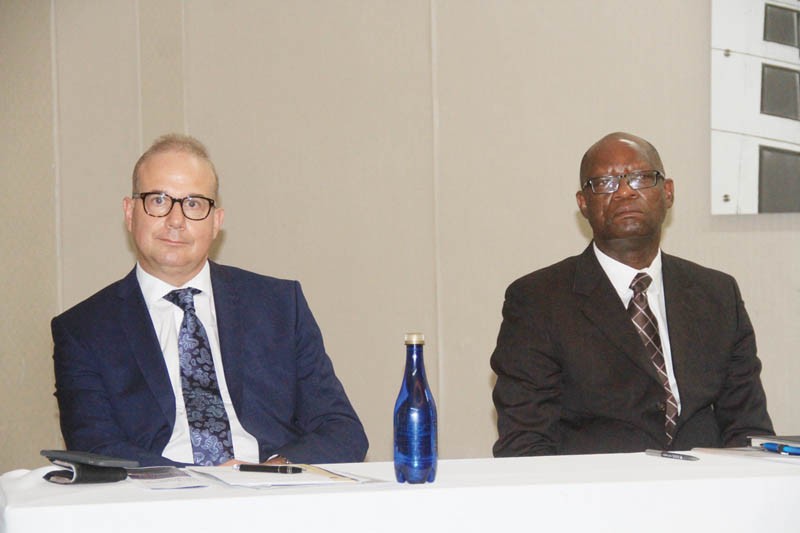Troubled BPC readies for dawn of new era
Isaac Pinielo | Friday November 4, 2016 16:56


Hopes of a reversal in fortunes are embedded in the corporation’s five-year game plan dubbed Masa 2020 Transformation Strategy that was initiated with the intent to turnaround the status of the corporation and make it profitable and efficient by 2020.
Masa is a Setswana word that means dawn, and it is the tagline that management is pinning its hopes on for the corporation’s rebirth.
Currently, the state-owned company is marred with a myriad of challenges amongst them; uncollected debts, non-performing assets, lack of borrowing capacity, and being technically bankrupt.
It has been reported that BPC’s debtors book has ballooned to P557 million this year from P400 million last year, largely due to non-payment of power bills by struggling mining companies choked by the international commodities crunch.
The corporation explained that its debtors have grown by about 40% as a result of increased uptake and tariff increase coupled with economic hardships particularly in the mining sector.
Other concerns include low customer satisfaction, average system losses, and slow service turnaround.
When addressing journalists this week, BPC board chairman, Sebetlela Sebetlela said the Masa 2020 transformation strategy has a vision to have transformed the corporation under the five strategic themes of financial turnaround, service delivery, safety, health, environment, risk and quality (SHERQ) culture, organisational efficiency and secure power supply.
“These themes will form the basis of performance management of the corporation,” he stated.
According to the chairperson, a robust corporate strategy was necessary for BPC to realise its vision of being “a leading power utility in the region by 2020”.
He said Masa 2020 is different because it is underpinned by execution and monitoring discipline, well defined organisational culture, well-articulated management standards, effective internal alignment strategies, comprehensive change management initiatives, enforced consequence management, and leadership or management visibility.
As a state-owned company for electrical power generation, transmission and distribution in Botswana, the BPC was established in 1970 and is currently the sole electricity supplier in the country.
The corporation, within the 23 years of existence, has developed from a small, oil-fired power station in Gaborone, which was commissioned in 1970 and dismantled in 1989, to better and more efficient thermal power stations in Selebi-Phikwe and Morupule using locally-mined coal.
The Morupule Power Station, which is more technologically advanced and adjacent to the colliery, provides approximately 80% of the country’s power requirements.
Reserve power is also provided by the international grid connections with South Africa to Gaborone and with Zambia/Zimbabwe to Francistown.
The national grid has dedicated extensions to the diamond mines at Orapa and the Soda Ash Project at Sua Pan from Francistown, and the Jwaneng Diamond Mine from Gaborone.
In order to meet the power needs of the nation and to promote rural development, BPC has introduced various assistance schemes to facilitate the electrification process throughout the country.
Sebetlela said the main focus right now is for the corporation to “get out of the hole” in order for it to be the best regional power producer.
Past attempts to save the ailing utility include the decision to make BPC subject to a management contract in 2013 for a period of three years, which was meant to enable the corporation to achieve performance turnaround and organisational transformation.
This was made following a business operations review consultancy that was carried out on BPC by an energy consultancy firm based in Ireland, ESB International Limited in the same year.
Despite all the efforts, the corporation continued to struggle to stay afloat leading to the country experiencing a fair share of unprecedented power shortages. The situation nearly reached crisis level when the country’s major power generation project, the 600MW Morupule B power plant experienced frequent operational failures.
With the continued power outages and the plant experiencing problems, a new company called STEAG Energy Services from Germany was engaged to take over operation and maintenance services of Morupule B.
That was after the corporation terminated its contract with the China National Electric Equipment Corporation (CNEEC).
Furthermore, the Ministry of Mineral Resources, Green Technology and Energy Security (formerly Ministry of Minerals, Energy and Water Resources) noted that a change process for BPC is envisaged, largely brought about by the corporation’s transformation from a retailer of power to an electricity generator with a higher asset base due to increased generation and transmission infrastructure.
“It is imperative that BPC be transformed from its current operating status to a financially viable power utility,” the ministry said.
It is believed that the external expertise will assist BPC to ready itself for competition in the electricity sector in line with government’s decision to open up the market to independent power producers. With the setting up of an electricity regulator, BPC will also be assisted to prepare itself to operate within a regulated environment.
The hope for the utility to achieve its goals was also buttressed by the appointment of a new chief executive officer, Stefan Schwarzfischer of German origin, who will serve the corporation on a five year contract.
A BPC spokesperson said the new CEO will provide strategic leadership and direction in order to achieve the successful recovery and transformation of the corporation into a technically sound, institutionally robust and financially stable utility capable of playing a central role in ensuring sustainable, reliable, affordable and dependable electricity.
With a team of experts, managers and professionals, the new CEO will strive to address the systematic problems affecting the corporation in order to rebuild BPC as a going concern.
The 50-year-old holds a Ph.D. in Process Engineering from the Technical University at his home land in Aachen, Germany.
He has held several C-level positions such as CEO, CFO and COO in the FMCG environments and has specialised in international business development and change management.
He has worked for KPMG Deutsche Treuhand-Gesellschaft in the area of corporate restructuring in Frankfurt and Johannesburg.
